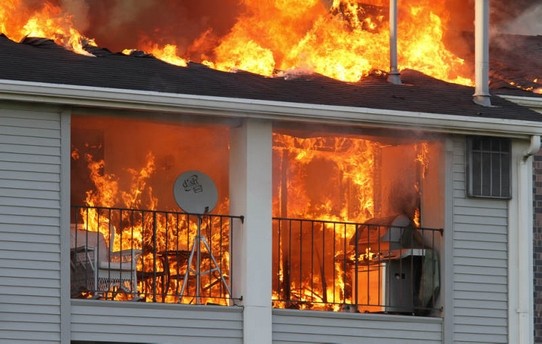Summer Fire Safety for Multifamilies
By Steve Bouzan, Director of Training and Safety
ARS Restoration Specialists
p: 877.461.1111
e: info@arsserv.com
When the sun stays out longer and temperatures warm, many of us in New England gather together with friends and family for BBQs. Nothing quite says summer nights like the smell of a grill! However, such seasonal activities also carry a high risk of fire hazards. Along with grilling, firepits, sparklers, cigarettes, citronella candles and yes, even fireworks (although illegal in Massachusetts), can make their way to any summer gathering. Safeguarding your tenants and your multi-unit property from a potential fire hazard is critical to avoiding a disaster situation.

This grill fire in Indian Harbour Beach, Florida led to all three floors being damaged and many becoming homeless. Indian Harbour Beach Fire Dept.
Grilling safety
Everyone loves a good BBQ but remind tenants that grills should only be used outdoors in well ventilated, designated areas at least ten feet from the building. Charcoal grills and gas grills work differently so each must be addressed as such. For charcoal, tenants should make sure to let the coals cool completely before disposing of them – and never in the trash cans! The best method is to cover them with water and mix to ensure all the coals are extinguished.
For propane powered grills, make sure to check the connection between the fuel line and the propane tank beforehand. Afterwards, make sure the propane tank is turned off - righty tightly lefty loosely may be the easiest way for people to remember which way truly shuts off the valve. Otherwise, forgetting to turn off the tank can cause an explosion as an excessive amount of gas in the air can easily ignite if another match or lighter is used in proximity. For a propane grill that emits a flame that becomes too large, cut the amount of oxygen by covering it, never throw water on a grill.
No matter which type of grill is in use, never pour or squirt lighter fluid directly onto a lit grill as a flashback may occur and cause serious burns. Encourage tenants to avoid loose fitting clothes while near a grill and to ensure children are kept at a safe distance even after the flames have been extinguished.
Remember, grills can never be used on a porch, balcony, or deck with a roof or overhang! This poster from the fire marshal gives more good tips.
Mulch fires are real
When people gather outside to barbeque, likely there is more than just the grill that is smoking. With just a flick of the wrist, cigarettes – both tobacco and marijuana – can quickly ignite a mulch fire which is extremely flammable in the right conditions. Everyone needs to be aware of how to properly dispose of cigarettes, but given the new Massachusetts laws surrounding marijuana, it is just as important to remind tenants to treat marijuana products and their disposal in the same manner to avoid a fire.
This is especially critical as the summer months wear on. During that time mulch can become very dry and very flammable. Most often it lines the garden beds closest to the property and thus a mulch fire not only threatens the outside landscape, but the building structure as well. Provide 18 inches between a mulch bed and combustible material such as vinyl siding, wood, and propane gas tanks to avoid a major fire event.
Educate your residents that summer is “mulch fire season” by posting signs around your building and reminding them to throw their cigarettes and joints in ash trays not in the mulch beds. One other little-known fact, when installing mulch on your property make sure it isn’t piled too deeply as heat can get trapped inside the mulch and ignite on its own. Mass.gov warns that mulch piled more than a few inches deep is a fire hazard.
Warn of flammable hazards
In addition to reminding tenants about your rules and requirements for commonly used summer items, be sure to communicate the dangers of flammable materials that may be nearby. Having the property painted? Working on a vehicle in the attached garage? Many of the common household items in place are highly flammable and should never be used near open flames.
Keeping “campfires” at camp
Many of us love to camp during the summer months and want to bring that experience home but building a campfire in an undesignated area can be incredibly dangerous. Remind tenants of what summer activities are and are not allowed as per your rental agreement. For example, if fire pits are provided at the property, communicate what can and cannot be used to ignite the fire. Don’t want fireworks? Remind tenants that they are not only illegal, but also dangerous in densely populated areas.
Head inside
While so many of these fire hazards are outdoor activities, it’s also a good time of year to head inside and check the fire prevention and alarm systems there as well. Manually check all fire alarms and ensure batteries are in place. Locate each of the property’s fire extinguishers and confirm the expiration dates are still valid.
No matter how many times you have provided reminders to your tenants, be sure to communicate anew with your residents and underscore just how important their role is in preventing fires. While there are no guarantees to fully safeguard your property from incidents, these suggestions will help to minimize potential issues and ensure everyone has a safe, enjoyable summer.




